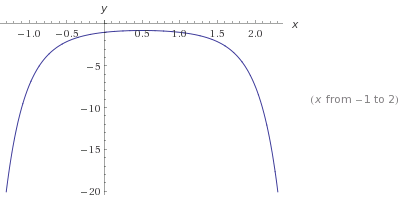Find the region
 Let
2
(
f
(
x
)
)
2
−
d
x
2
d
2
f
(
x
)
f
(
x
)
+
(
d
x
d
f
(
x
)
)
2
=
0
and
f
(
0
)
=
f
(
1
)
=
−
1
Let
2
(
f
(
x
)
)
2
−
d
x
2
d
2
f
(
x
)
f
(
x
)
+
(
d
x
d
f
(
x
)
)
2
=
0
and
f
(
0
)
=
f
(
1
)
=
−
1
Then the area of the region bounded by y=0, x=0, x=1 and y = ( 2 x − 1 ) f ( x ) is 2 ( 1 − e 1 / a 1 )
Then the value of a is???
The answer is 4.
This section requires Javascript.
You are seeing this because something didn't load right. We suggest you, (a) try
refreshing the page, (b) enabling javascript if it is disabled on your browser and,
finally, (c)
loading the
non-javascript version of this page
. We're sorry about the hassle.
Rearranging the given differential equation we get
2 = d f ( x ) f ′ ( x )
Integrating twice w.r.t x we get x 2 + a x + b = ln f ( x ) for some a , b ∈ C . Now using initial conditions of f ( 0 ) = f ( 1 ) = − 1 we get a = − 1 , b = i π . So y = ( 1 − 2 x ) e x 2 − x = Y (say).
Here is the plot of the required area(in red)
So area = 0 ∫ 2 1 Y d x − 2 1 ∫ 1 Y d x = 2 ( 1 − e 4 1 1 ) . So a = 4 .